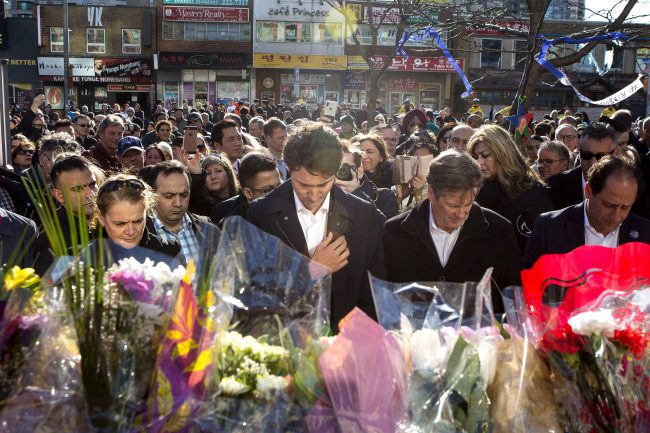The man accused of a deadly van attack on a busy Toronto sidewalk one year ago identified as an incel — launching a nation-wide conversation about internet culture in Canada.

Alek Minassian, charged with 10 counts of first-degree murder and 16 counts of attempted murder in connection with the attack, is expected to appear in court at a pre-trial hearing in the coming weeks.
Hours before the attack he allegedly posted on Facebook, saying the “incel rebellion has already begun.”
Men who identify as incels, or “involuntary celibates,” like Minassian, say they feel socially and sexually rejected by women. They are typically misogynists who are often associated with the men’s rights movement, and usually see women as inferior and believe they should make themselves available to sexually gratify the men.
After the attack, Minassian was praised on incel forums — on websites like 4Chan (a message board notorious for hosting hateful rhetoric) — with many calling him a hero.
The dead and injured in the van attack were predominantly female.
WATCH: Police release names of Toronto van attack victims

After the attack, dozens of articles from Canadian and international news outlets shone a spotlight on the little-known movement.
Governments and police vowed to fight it. But one year after the attack, activists say more needs to be done.
‘Little has changed in the last year’
Beth Malcolm, vice president of community initiatives at the Canadian Women’s Foundation, said the van attack initially sparked discussion about the impact violence movements, like incels, have on society.
“We talked about the violence against women and the misogyny a lot at the time, and then people had forgotten about it,” Malcolm said.

Get breaking National news
A spokesperson from Public Safety Canada told Global News that the “solutions against radicalization to violence” come from the local level, and there are a number of projects sponsored by the Community Resilience Fund.
READ MORE: ‘This changes everything’ — residents react to Toronto van attack
The RCMP told Global News they monitor and evaluate any potential threats, including those that may be hate-motivated, such as incels.
Evan Balgord of Canadian Anti-Hate Network said the government needs to step up and take more action.
“Little has changed in the last year from the government — no new legislation, no meaningful government investments and very little action from law enforcement,” he said.
He said there has been some research funding, but there are few, if any, resources to actually counter hate groups.

Balgord said the Canadian Anti-Hate Network has been successful in monitoring and countering hate groups and targeting sources of hate propaganda to reduce radicalization leading to violence.
“So we’re a new, positive development, but we can’t be everywhere at once,” he said.
Difficult to stop online hate
Websites such as 4chan and 8chan, which are known as the “darkest reaches of the internet,” are home to message boards where white supremacy and misogyny are discussed openly.
Former FBI agent Michael German says it’s “remarkable” how openly people discuss violence on sites like 8chan.
He said it’s extremely difficult to keep up with all the threats and discussions of violence because there are so many, and they often don’t amount to anything.
Users on the sites are also usually very technologically advanced, so it’s often hard for law enforcement to track their location or determine their identities, German explained.
However, he said a threatening post can become a good piece of evidence if it does lead to an attack.
“Those channels leave breadcrumbs that law enforcement and researchers can track,” German said.
WATCH: ‘It’s a support group for men, not a movement’ — spokesperson defends incel community

Prevention is key
Malcolm said any action against incel ideology can’t just be monitoring, it also must be aimed at prevention.
“It’s the prevention piece that has to be multipronged,” she said.
“There has to be the prevention, but it also has to be tackling the issue of violence against women and misogyny.”
She said while combating the ideology is one thing, we need to do more to prevent young men from being drawn into the movement.
More research needs to be done to look into why young people are drawn into the movement, she said, and more education needs to be provided to children about healthy relationships.
WATCH: Mélanie Joly calls on ‘web giants’ to counter hate speech online

Keegan Hankes of the Southern Poverty Law Center (SPLC) said forums like Facebook and Reddit can be used to curb violent hate speech. But, if possible, a better solution is to try to intervene early with people who seem susceptible to these kinds of messages.
“Individuals who imbibe this stuff and sit in these echo chambers — it’s a little bit like a downward spiral,” said Hankes.
“Once you’ve accepted some of these axioms — it’s women’s fault that these things are happening to me, or some other protected class is the reason my life isn’t going as well as it should — it only goes down from there and you can start getting more and more extreme.”
— With files from Global News’ Patrick Cain and Josh K. Elliott
- ‘We now have to figure out how to live life without her’: Mother of Tumbler Ridge shooting victim speaks
- Trump slams Canada as U.S. House passes symbolic vote to end tariffs
- Carney, federal party leaders to attend Tumbler Ridge shooting vigil Friday
- Mental health support after Tumbler Ridge shooting ‘essential,’ experts say









Comments
Comments closed.
Due to the sensitive and/or legal subject matter of some of the content on globalnews.ca, we reserve the ability to disable comments from time to time.
Please see our Commenting Policy for more.